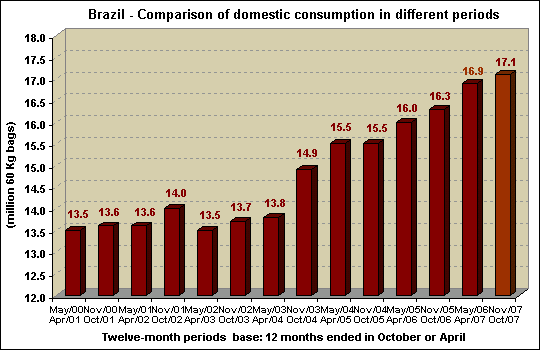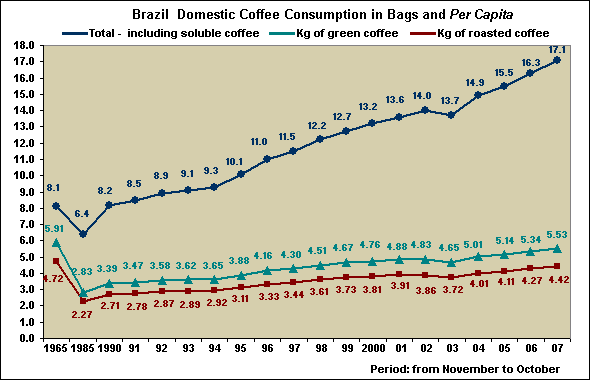INDICATORS OF THE COFFEE INDUSTRY IN BRAZIL
This result places the Brazilian consumption per inhabitant/year (5.53 kg/inhabitant/year) at levels very similar to those of countries such as Germany (5.86 kg/inhabitant/year), France (5.07 kg/inhabitant/year) and Italy (5.63 kg/inhabitant/year) which are among those that have the largest consumption per capita in the whole world, according to data from ICO – International Coffee Organization. In Brazil, domestic consumption evolved 24.8% since 2003, from 13.7 million bags to the current 17.1 million bags. Furthermore, the Brazilian market represents 14% of world coffee demand, and 32% of the whole Europe consumption, including the Eastern Europe countries. We continue to represent more than 50% of the whole domestic consumption of coffee producing countries. Again this year, for the fifth consecutive time, ABIC considered that the growth of non-associated and informal companies was smaller (2.85%) than of the associated companies (5.63%). The survey allocates to those companies a variation equal to half the Brazilian GDP growth. This hypothesis is favorable to the reliability of the data, since it brings the final figure to smaller values. The Importance of domestic consumption in coffee production For 2008, the domestic consumption growth together with exports of around 28 million bags, will result in a total demand of almost 46 million bags. Consequently, even considering the new 2007/2008 crop of large volume, ABIC understands that there will be no excess beans, especially because the physical stocks until March 2008 will be at their lowest levels in the last decades. Therefore, measures to restrict the coffee offer to the market would not be justified. ABIC will continue to pursue the target of meeting the 21-million bag goal by 2010. For this domestic consumption should grow at an average rate of 6% a year, adding another 1.1 million bags every 12 months. In the coming years the entity intends to increase and consolidate the Superior, Gourmet and Specialty coffee markets, to meet the increasingly more evident demand among Brazilian consumers, even among those products with higher added value. Consequently, in 2007, ABIC expanded the range of its quality and certification programs to allow industries to have a firmer insertion in the unique high quality coffee product market. With this result, Brazil maintains an important position in the world scenario of the coffee agribusiness, since it is one of the countries where domestic coffee consumption growth is expanding the most. This is one of the most effective forms of giving sustainability to world coffee production, therefore not allowing any coffee bean surpluses, which would make coffee quotes drop to prices that would not adequately remunerate the coffee productive chain agents. The reasons for consumption expansion Consumption trends Coffee consumption in class A continues to expand, because of the offer of coffees of the Gourmet type of coffees, better coffee quality and more value, as well as influenced by consumption away from home in coffee shops and coffee houses. Consumption among teenagers between 15 and 19 years old continue to be a challenge for the coffee industry. In this age bracket, figures did not increase. Consumers’ positive perception of coffee still needs to be approached in more depth. Among consumers (91%) the reasons to reduce coffee consumption due to health problems, increased to 47% in 2007, after registering 33% in 2006. On the other hand, the medical community demonstrated a substantial improvement in their perception of coffee. The survey shows that their recommendations to reduce coffee consumption decreased from 12% in 2006 to 7% in 2007. This demonstrates the good influence of the Coffee and Health Program, developed by ABIC together with DCAF – Coffee department of the Ministry of Agriculture, with the approval of the CDPC – Coffee Policy Decision-Making Council (Conselho Deliberativo da Politica do Café – CDPC). Consumption away from home continues to expand in coffee shops, coffee houses, restaurants, bakeries, etc. The survey shows that in the large capital cities it expanded from 32% in 2006 to 36% in 2007. In 2008, strong coffee- shop expansion will continue in the whole Country, as will the expansion of foreign companies’ coffee shops that have recently arrived in São Paulo. The Brazilian domestic market is ripe to assimilate innovations and new products. Investments in Advertising and Promotion The 2007 Integrated Marketing Program – (2007 PIM) of the Ministry of Agriculture, Livestock and Food Supply (Ministério da Agricultura, Pecuária e Abastecimento) coordinated by DCAF – Coffee Department of the Secretariat of Production and Agroenergy (Secretaria de Produção e Agroenergia), has access to funds from FUNCAFE and invested only R$2.2 million in the domestic market, because of the reduction of government’s advertising funds, but invested R$5 million to promote coffee abroad, with important participation in fairs, coffee tasting and events in Japan, Korea, the USA, Germany, Rumania, Chile and other countries, in addition to producing various promotion and information materials about Cafés do Brasil. These programs had a fundamental importance in promoting coffee domestically and abroad, such as in developing the Coffee and Health Program, the purpose of which is to generate information and knowledge for the scientific and medical communities, and to consumers in general, about the benefits of daily and moderate intake of coffee for human health. During the 2007 PAN RIO (Pan-American Games) in Rio de Janeiro, a large promotion action was carried out on the benefits of coffee to health, whose theme was “Coffee is also Health”. During 30 days, the theme was aired by radio stations, in direct contact with the public in coffee shops, and especially in sports stadiums where the 2007 Pan Rio Competitions were held. Also important were the Cafés do Brasil Road Shows that visited 13 capital cities and large Brazilian cities and was installed in shopping malls disseminating instructive materials, information and knowledge about coffee, from the plantation to how to prepare it in many types of coffee pots, in addition to tips about the differences in flavor and aroma resulting from roasting points and different grindings. This action was also the result of an agreement between ABIC and MAPA-DCAF. More concentration in the industry Perspectives for 2008 ABIC believes that its various coffee quality programs and consumer education programs will be consolidated in 2008, and will drive coffee consumption and demand for coffees with higher added value. They are: Purity Seal; PQC – Coffee Quality Program; CCQ – Quality Coffee Circle; PCS – Sustainable Coffees of Brazil; and Coffee with School Meals, Health in School. The threats to consumption increase Need for a long term plan for the development of the Cafés do Brasil agribusiness |
| Tabela – Coffee domestic consumption – total annual production October /2007 | ||||||||||||||||||||||||||||||||||||||||
| ||||||||||||||||||||||||||||||||||||||||
| Volume in 60 kg bags (1) Source: market Source: ABIC |
| Chart -Development of domestic coffee consumption in Brazil | ||
| Chart – Comparison of domestic consumptionin Brazil in different periods | ||
| Annual coffee domestic consumption in Brazil | ||||||||||||||||||||||||||||||||||||||||||
| From November 2006 to October 2007 (volume in 60-Kg bags) | ||||||||||||||||||||||||||||||||||||||||||
| ||||||||||||||||||||||||||||||||||||||||||
| No. of companies – through coffee data gathered by PAIC – Purity Seal and updated data from regional associations. Source: ABIC | ||||||||||||||||||||||||||||||||||||||||||
| Coffee domestic consumption by bags and per capita – Brazil | ||||||||||||||||||||||||||||||||||||||||||||||||||||||||||||||||||||||||||||||||||||||||||
| ||||||||||||||||||||||||||||||||||||||||||||||||||||||||||||||||||||||||||||||||||||||||||
| ||||||||||||||||||||||||||||||||||||||||||||||||||||||||||||||||||||||||||||||||||||||||||
| Período: November – October 60-Kg bags Source: ABIC | ||||||||||||||||||||||||||||||||||||||||||||||||||||||||||||||||||||||||||||||||||||||||||
| Chart – Brazil – Domestic coffee consumption in bags and per capita | ||
| Brazil – Production and share by group of companies October 2007 | ||||||||||||||||||||||||||||||||||||||||||||
| ||||||||||||||||||||||||||||||||||||||||||||
| Notes: Members and Non-members Production periods considered: 2005/2006 – from November 2005 to October 2006 2006/2007 – from November 2006 to October 2007 Only roasted and ground coffees were considered Source: ABIC | ||||||||||||||||||||||||||||||||||||||||||||
| List of the 100 largest Coffee Industries Members of ABIC October 2007 | |||||||||||||||||||||||||||||||||||||||||||||||||||||||||||||||||||||||||||||||||||||||||||||||||||||||||||||||||||||||||||||||||||||||||||||||||||||||||||||||||||||
|

